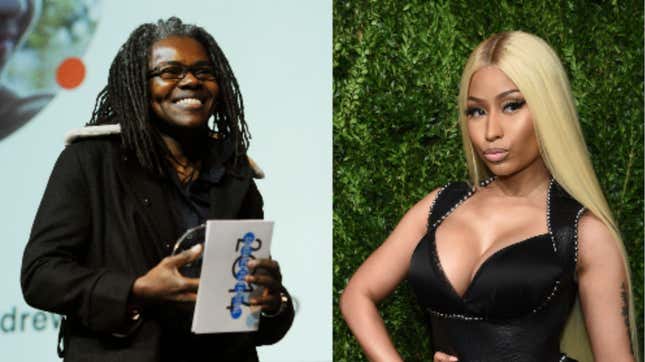
A years-long dispute is finally over—and it didn’t even have to go through the court trial process!
According to The Hollywood Reporter, Tracy Chapman has accepted Nicki Minaj’s offer to pay $450,000 for illicitly using Chapman’s “Baby Can I Hold You” in the rapper’s song, “Sorry.” Chapman filed a copyright infringement claim against the 38-year-old artist (who is now a new mother to an adorable baby boy!) back in 2018.
As background, Minaj sent multiple requests to Chapman’s team back in June 2018 to license the song from Chapman’s 1988 eponymous debut album, all of which were denied. However, things escalated quickly when “Sorry” debuted that August on The Breakfast Club. Welp.
The most recent major decision in the suit before now actually ended up favoring Minaj as Judge Virginia A. Phillips ruled that the song fell under the “fair use” doctrine.
“Artists usually experiment with works before seeking licenses from rights holders and rights holders typically ask to see a proposed work before approving a license,” Phillips wrote in the judgment handed out this past September. “A ruling uprooting these common practices would limit creativity and stifle innovation within the music industry.”
On this week’s development, THR adds:
On Thursday, documents became public in California federal court reflecting the fact that Chapman had accepted Minaj’s offer of judgment. As a result, the two will not proceed to a trial later this year. By accepting Minaj’s offer, Chapman not only scores a win in the case and $450,000, the esteemed singer also avoids being responsible for costs had a jury eventually decided her claims weren’t worth that amount.
“I am glad to have this matter resolved and grateful for this legal outcome which affirms that artists’ rights are protected by law and should be respected by other artists,” Chapman said in a statement, in regards to this suit’s conclusion. “I was asked in this situation numerous times for permission to use my song; in each instance, politely and in a timely manner, I unequivocally said no. Apparently Ms. Minaj chose not to hear and used my composition despite my clear and express intentions.”
“This lawsuit was a last [resort]—pursued in an effort to defend myself and my work and to seek protection for the creative enterprise and expression of songwriters and independent publishers like myself,” Chapman added.

